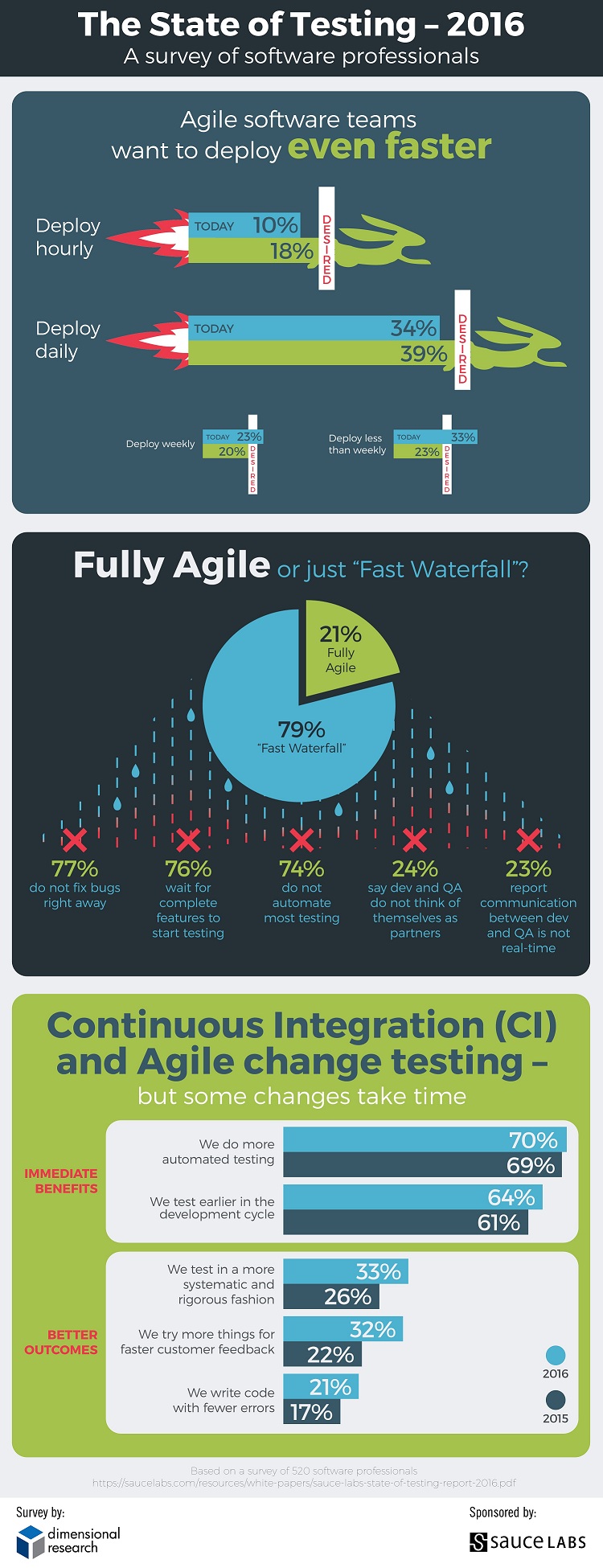Check Point® Software Technologies Ltd.(link is external) has been recognized on Newsweek’s 2025 list of America’s Best Cybersecurity Companies(link is external).
While 88 percent of organizations say they have adopted agile development, only one in five have fully implemented the five best software testing practices typically associated with a mature agile development process, according to Testing Trends in 2016: A Survey of Software Professionals, commissioned by Sauce Labs and conducted by Dimensional Research.
Development teams continue to adopt agile methodologies like continuous integration (CI) to build better software faster. What is surprising from this report is the revelation that many teams who believe they are practicing an agile testing process are really performing "fast waterfall" instead. This presents a huge opportunity for these teams to continue to improve their processes, increase their use of automation and accelerate development even further.
In addition to revealing the prevalence of fast waterfall development, the findings also reveal that the market continues its adoption of CI, with 77 percent of respondents citing use of the modern development technique within their teams, up from 70 percent from last year.
Importantly, the research also reveals that these teams are beginning to reap the benefits of Continuous Integration, with respondents reporting that implementing CI has resulted in more systematic and rigorous testing, the introduction of more new features for rapid customer feedback and writing code with fewer errors.
Cross-browser testing also remains important with 95 percent of large companies performing some type of cross-browser testing. In addition, Microsoft’s new browser released in August 2015 is already grabbing the attention of developers with almost one-third of respondents saying they test their applications on Microsoft Edge.
Additional key findings from the report include:
Agile is ubiquitous but few have fully embraced testing best practices
■ 67 percent of respondents say their teams deploy new builds at least weekly
■ 46 percent say they want a faster deployment time than they currently have
■ Only one in five say (21 percent) their teams have achieved all five key areas of agile testing maturity, including:
- 23 percent of teams fix bugs right away
- 24 percent iterate small testable requirements rather than waiting for features to be complete ○ 26 percent of teams have more automated testing than manual
- 77 percent of development and QA teams communicate in real-time
- 86 percent of development and QA teams think of themselves as partners
Continuous Integration (CI) changes testing
■ More respondents acknowledged the benefits of CI compared to 2015, which include: more rigorous testing (33 percent), trying more features for customer feedback (32 percent) and writing code with fewer errors (21 percent) in the current report
Cross-Browser Testing remains important, especially for large organizations
■ 95 percent of large companies perform cross browser testing compared to 86 percent of small companies
■ 68 percent of large companies test on older browser versions versus only 60 percent of small companies
■ 32 percent of respondents say they test applications on Microsoft Edge
■ The need for Internet Explorer testing has not decreased in past year
“Development teams are beginning to see real benefits of implementing Continuous Integration (CI),” said Diane Hagglund, Principal Researcher of Dimensional Research. “The report reveals that while certain benefits may not be seen immediately, there are considerable long-term advantages to CI that make its adoption worthwhile.”

Survey Methodology: A global database of software professionals responsible for the quality of web applications was emailed an invitation to participate in a Web survey on the topic of testing trends. A total of 520 individuals completed the survey. Participants included a variety of roles, company sizes, industries and regions. Certain questions were repeated from a similar survey conducted with the same audience one year ago to capture changes.
Industry News
Red Hat announced enhanced features to manage Red Hat Enterprise Linux.
StackHawk has taken on $12 Million in additional funding from Sapphire and Costanoa Ventures to help security teams keep up with the pace of AI-driven development.
Red Hat announced jointly-engineered, integrated and supported images for Red Hat Enterprise Linux across Amazon Web Services (AWS), Google Cloud and Microsoft Azure.
Komodor announced the integration of the Komodor platform with Internal Developer Portals (IDPs), starting with built-in support for Backstage and Port.
Operant AI announced Woodpecker, an open-source, automated red teaming engine, that will make advanced security testing accessible to organizations of all sizes.
As part of Summer '25 Edition, Shopify is rolling out new tools and features designed specifically for developers.
Lenses.io announced the release of a suite of AI agents that can radically improve developer productivity.
Google unveiled a significant wave of advancements designed to supercharge how developers build and scale AI applications – from early-stage experimentation right through to large-scale deployment.
Red Hat announced Red Hat Advanced Developer Suite, a new addition to Red Hat OpenShift, the hybrid cloud application platform powered by Kubernetes, designed to improve developer productivity and application security with enhancements to speed the adoption of Red Hat AI technologies.
Perforce Software announced Perforce Intelligence, a blueprint to embed AI across its product lines and connect its AI with platforms and tools across the DevOps lifecycle.
CloudBees announced CloudBees Unify, a strategic leap forward in how enterprises manage software delivery at scale, shifting from offering standalone DevOps tools to delivering a comprehensive, modular solution for today’s most complex, hybrid software environments.
Azul and JetBrains announced a strategic technical collaboration to enhance the runtime performance and scalability of web and server-side Kotlin applications.
Docker, Inc.® announced Docker Hardened Images (DHI), a curated catalog of security-hardened, enterprise-grade container images designed to meet today’s toughest software supply chain challenges.
GitHub announced that GitHub Copilot now includes an asynchronous coding agent, embedded directly in GitHub and accessible from VS Code—creating a powerful Agentic DevOps loop across coding environments.




